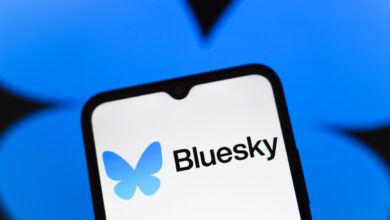The Download: AI-restored voices, and bot relationships

This is today’s edition of The Download, our weekday newsletter that provides a daily dose of what’s going on in the world of technology.
Motor neuron diseases took their voices. AI is bringing them back.
Jules Rodriguez lost his voice in October of last year. His speech had been deteriorating since a diagnosis of amyotrophic lateral sclerosis (ALS) in 2020, but a tracheostomy to help him breathe dealt the final blow.
Rodriguez and his wife, Maria Fernandez, who live in Miami, thought they would never hear his voice again. Then they re-created it using AI. After feeding old recordings of Rodriguez’s voice into a tool trained on voices from film, television, radio, and podcasts, the couple were able to generate a voice clone—a way for Jules to communicate in his “old voice.”
Rodriguez is one of over a thousand people with speech difficulties who have cloned their voices using free software from ElevenLabs. The AI voice clones aren’t perfect. But they represent a vast improvement on previous communication technologies and are already improving the lives of people with motor neuron diseases. Read the full story.
—Jessica Hamzelou
The AI relationship revolution is already here
AI is everywhere, and it’s starting to alter our relationships in new and unexpected ways—relationships with our spouses, kids, colleagues, friends, and even ourselves. Although the technology remains unpredictable and sometimes baffling, individuals from all across the world and from all walks of life are finding it useful, supportive, and comforting, too.
People are using large language models to seek validation, mediate marital arguments, and help navigate interactions with their community. They’re using it for support in parenting, for self-care, and even to fall in love. In the coming decades, many more humans will join them. And this is only the beginning. What happens next is up to us. Read the full story.
—Rhiannon Williams
This subscriber-only story is the next edition of our print magazine, which is all about relationships. Subscribe now to get a copy when it lands on February 26!
What a major battery fire means for the future of energy storage
A few weeks ago, a fire broke out at the Moss Landing Power Plant in California, the world’s largest collection of batteries on the grid. Although the flames were extinguished in a few days, the metaphorical smoke is still clearing. Residents have reported health issues, and pollutants have been found in the water and ground nearby. A lawsuit has been filed.
In the wake of high-profile fires like Moss Landing, there are understandable concerns about battery safety. At the same time, as more wind, solar power, and other variable electricity sources come online, large energy storage installations will be even more crucial for the grid.
Read our story to catch up on what happened in this fire, what the lingering concerns are, and what comes next for the energy storage industry.
—Casey Crownhart
This story is from The Spark, our weekly newsletter explaining the tech solving the climate crisis. Sign up to receive it in your inbox every Wednesday.
The must-reads
I’ve combed the internet to find you today’s most fun/important/scary/fascinating stories about technology.
1 Inside Elon Musk’s AI coup
If you think government run by AI sounds dystopian, you’d be right. (New Yorker $)
+ Can AI help DOGE slash government budgets? It’s complex. (MIT Technology Review)
+ Musk says DOGE is being transparent. That couldn’t be further from the truth. (Gizmodo)
2 OpenAI is loosening restrictions on what its bots can say
It’s nudging the balance away from safety, and towards ‘intellectual freedom’. (The Verge)
+ Musk’s lawyers say he’ll withdraw his $97.4 billion bid for OpenAI if it drops plans to become a for-profit company. (Reuters $)
3 Dating apps leave people in the dark over dangerous users
Match Group seems to do shockingly little in response to reports of rape. (The Guardian)
4 Apple is reportedly exploring humanoid robots
But it’s still very early days, so I wouldn’t like to bet on anything coming to fruition just yet. (TechCrunch)
+ Here’s what’s next for robots. (MIT Technology Review)
5 Efficiency is the new frontier for AI
DeepSeek claims to have built a model for $6 million. Another team says they’ve done it for just $6. (The Economist $)
+ China’s EV companies are racing to add DeepSeek’s AI to their cars. (Business Insider $)
+ China’s smartphone makers are rushing to adopt it too. (South China Morning Post $)
6 Apple just launched a giant health study
It will analyze how data from its devices can monitor, manage and predict changes in users’ health. (CNBC)
7 Inside the radically unambitious return of Pebble smartwatches 
It’s kinda telling that building devices that can last for years is so unusual. (Fast Company $)
8 Syria just hosted its first international tech conference in 50 years
Hope abounds as the country starts to rebuild after a 13-year-old civil war. (Rest of World)
9 The guy who threw away $775 million in Bitcoin wants to buy the garbage dump
He’s never going to give up, is he. (Quartz $)
10 Google is going to get AI to guess how old you are for age verification
I fear it’d take one look at my tastes and add on a few decades. (The Verge)
Quote of the day
“The AI summaries of questions on Ask are terrible. Can we go back to answering the questions people actually asked?”
—Google employees bemoan the use of AI to compile their various questions into a single one during all-staff meetings, The Guardian reports.
The big story
Whatever happened to DNA computing?

October 2021
For more than five decades, engineers have shrunk silicon-based transistors over and over again, creating progressively smaller, faster, and more energy-efficient computers in the process. But the long technological winning streak—and the miniaturization that has enabled it —can’t last forever.
What could this successor technology be? There has been no shortage of alternative computing approaches proposed over the last 50 years. Here are five of the more memorable ones. Read about five of the most memorable ones.
—Lakshmi Chandrasekaran
We can still have nice things
A place for comfort, fun and distraction to brighten up your day. (Got any ideas? Drop me a line or skeet ’em at me.)
+ Monty is such a good boy that he’s been crowned best dog in America.
+ A shortcut recipe for chicken rice? I’m going to have to try it out.
+ If you’ve got a tight neck and shoulders, a quick hit of relief is just ten minutes away.
+ To make lasting changes to your life, motivation has to come from within.




